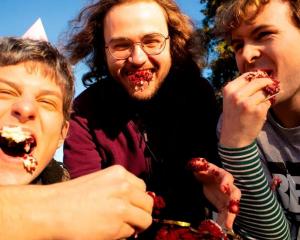
MacGowan brought Irish traditional music to a huge new audience in the late 1980s by splicing it with punk, and achieved mainstream success with his bittersweet, expletive-strewn 1987 Christmas anthem "Fairytale of New York".
But he became just as well known for his slurred speech, missing teeth and on-stage meltdowns, with drug and alcohol abuse leading to the Pogues firing him at the height of the group's success in 1991.
With his health near collapse in his 30s, few at the time expected him to survive into old age.
The singer died in the early hours of Thursday with his family at his side, his wife, sister and father said in a statement on X.
In an Instagram post featuring a picture of MacGowan smiling with a wine glass and cigarette, his wife Victoria Mary Clarke said he had gone to be with "Jesus and Mary, and his beautiful mother Therese".
"Thank you for your presence in this world, you made it so very bright and you gave so much joy to so many people with your heart and soul and your music," she added.
Born in the English county of Kent to Irish parents on Christmas Day 1957, MacGowan in his autobiography described early childhood summers spent at an Irish farmhouse with his extended family, drinking, smoking and singing traditional songs.
"

After winning a scholarship to the prestigious Westminster School in London, MacGowan struggled to fit in and was expelled two years later for drug use and started hanging out in London bars with other musicians.
At 17, his alcohol and drug use helped trigger a mental breakdown and he was kept in a psychiatric hospital for six months.
After recovering, he embraced the eruption of punk in London in the late 1970s and early 80s. Following a fad for fusions of traditional music from around the world, MacGowan started screaming Irish ballads over distorted guitars, setting up a band called Pogue Mahone - Gaelic for "kiss my ass".
The band, which later shortened its name to The Pogues, released their debut album in 1984, catching the attention of the British music press with its irreverent lyrics about drinking and fighting with penniless Irish immigrants on the streets of London.
'A PAIR OF BROWN EYES'
But it was "A Pair of Brown Eyes" on their 1985 follow-up album - the Elvis Costello-produced "Rum Sodomy & the Lash" - that demonstrated MacGowan's immense talents as a songwriter, a song that paved the way for later classics like "A Rainy Night in Soho" and "Summer in Siam".
The Clash's Joe Strummer, who later played with the Pogues and briefly replaced MacGowan as lead singer, described MacGowan at the time as a visionary, a poet and "one of the finest writers of the century".
Irish President Michael D. Higgins, also a poet, described MacGowan on Thursday as one of music's greatest lyricists.
"So many of his songs would be perfectly crafted poems, if that would not have deprived us of the opportunity to hear him sing them," Higgins said. "His words have connected Irish people all over the globe to their culture and history."
The height of the Pogues success came in 1987 with "Fairytale of New York", which MacGowan sang in a duet with Kirsty MacColl to create an instant Christmas classic, despite radio unfriendly lyrics in which the estranged couple exchange insults.
After a series of hallucinogenic benders, including one night in New Zealand when he stripped naked and painted himself blue, the Pogues fired MacGowan during a 1991 tour of Japan.
Following a decade with a new band, the Popes, MacGowan and the Pogues reunited and toured regularly until 2014.
In 2018 singers Bono, Nick Cave and Sinead O'Connor, Sex Pistols bassist Glen Matlock and actor Johnny Depp joined MacGowan on stage in the refined surroundings of Dublin's National Concert Hall for a show to celebrate his 60th birthday.
President Higgins bowed his head in admiration of the wheelchair-bound MacGowan as he presented him with the venue's lifetime achievement award at that event.
MacGowan was “a true friend and the greatest songwriter of his generation," Cave said on Thursday. "A very sad day.”












